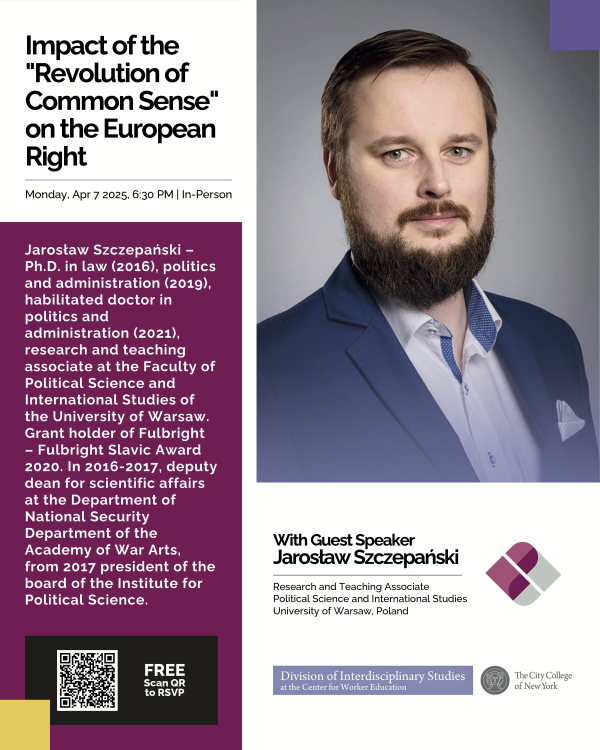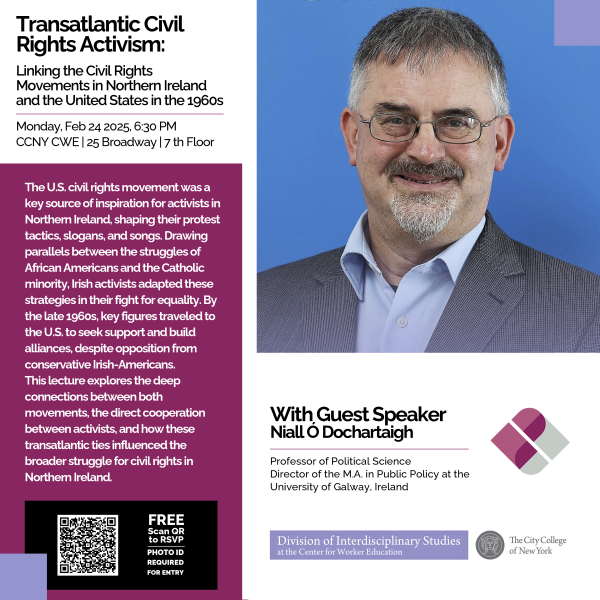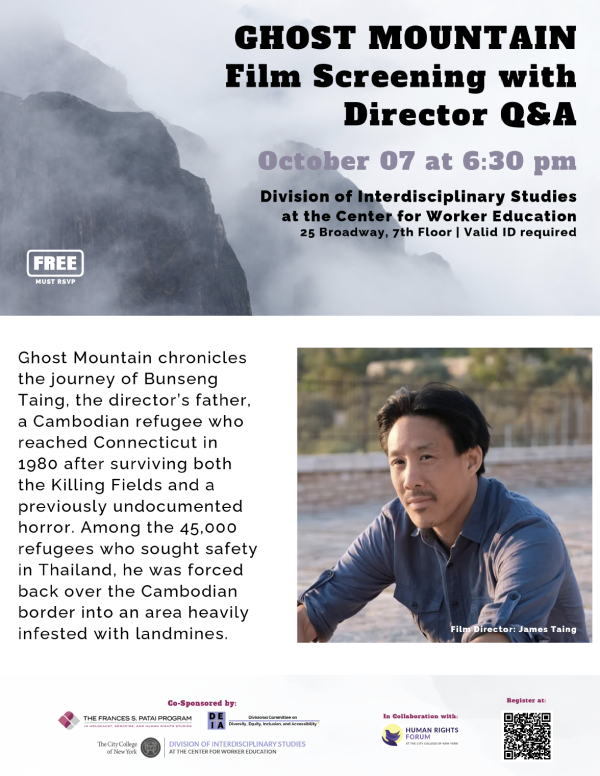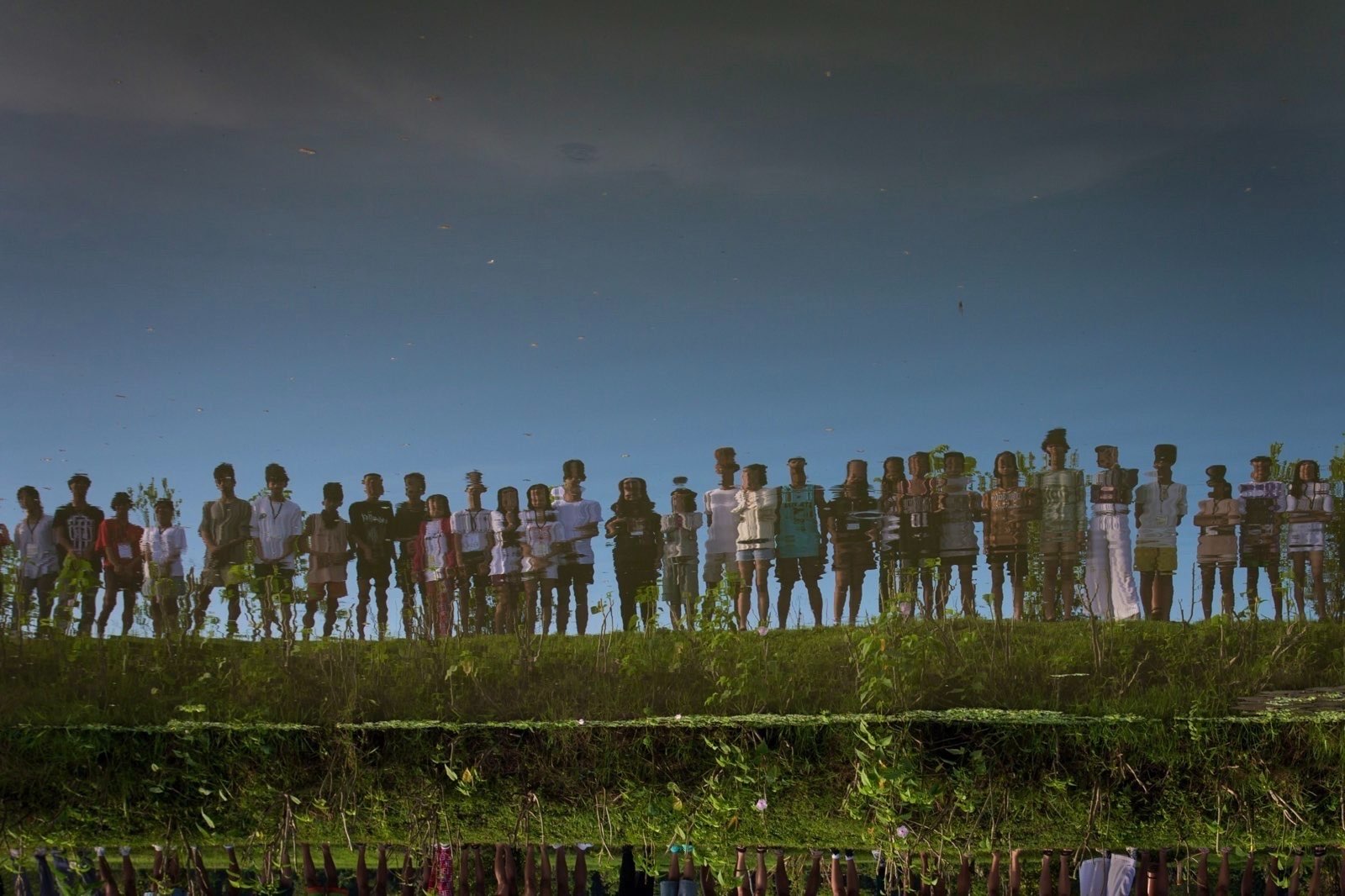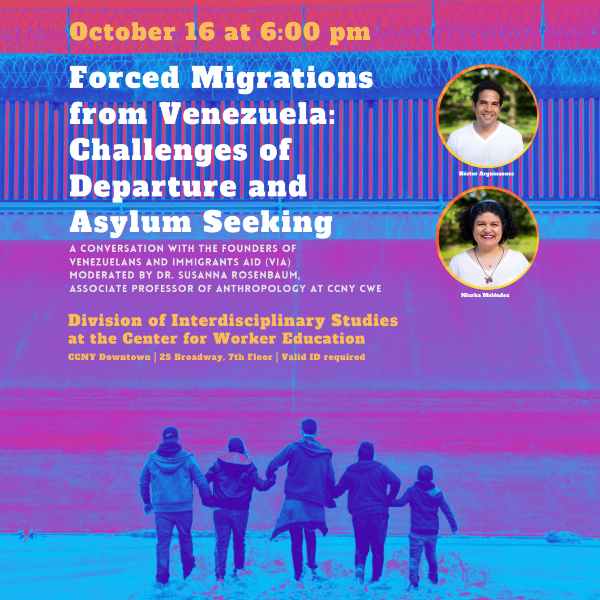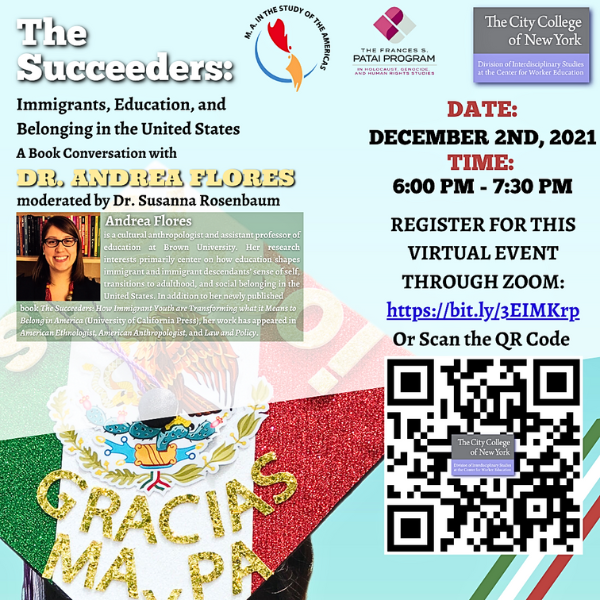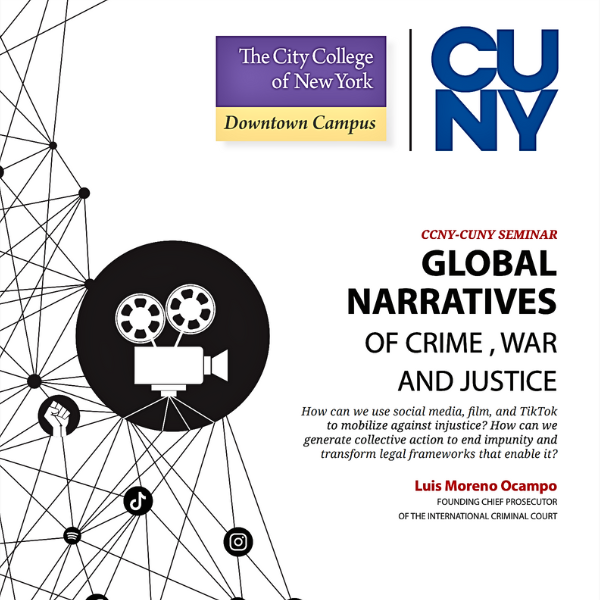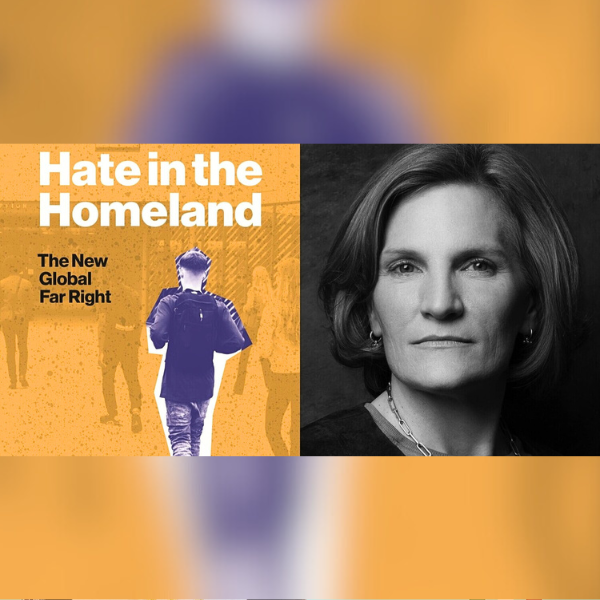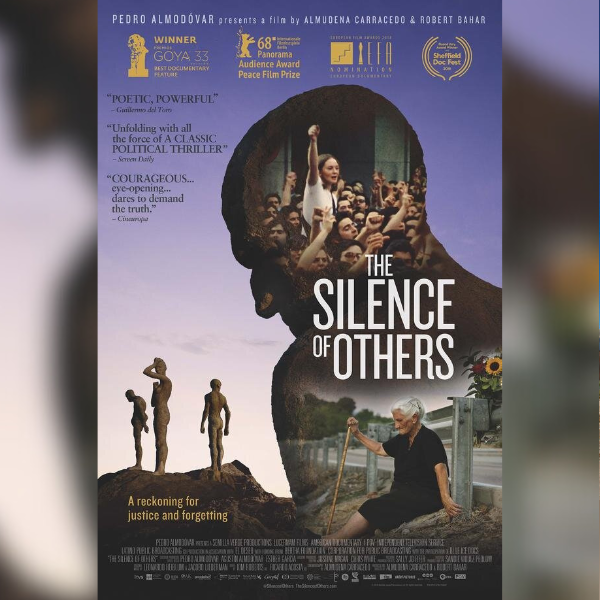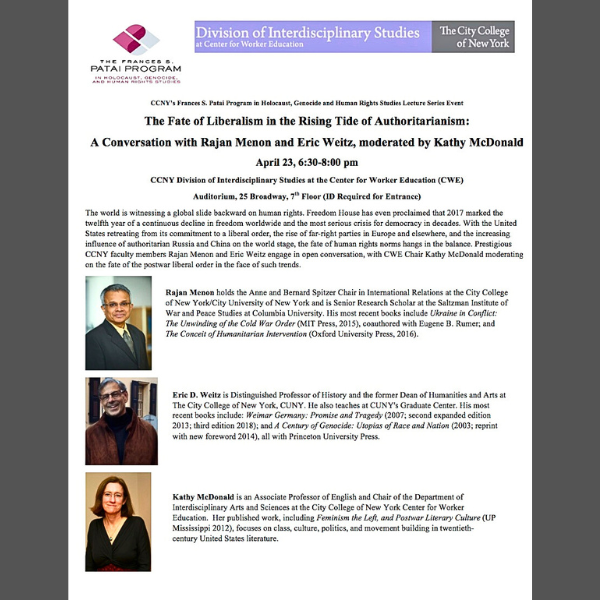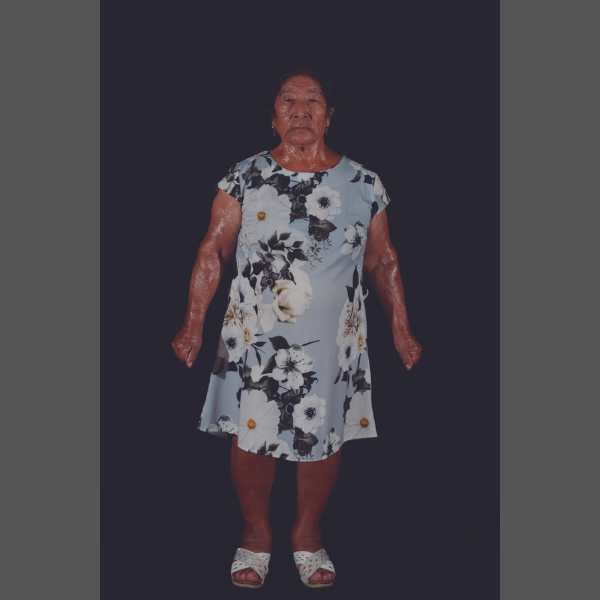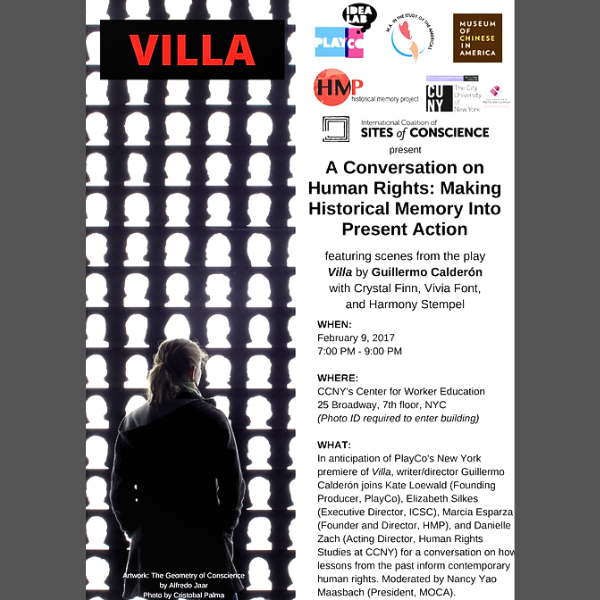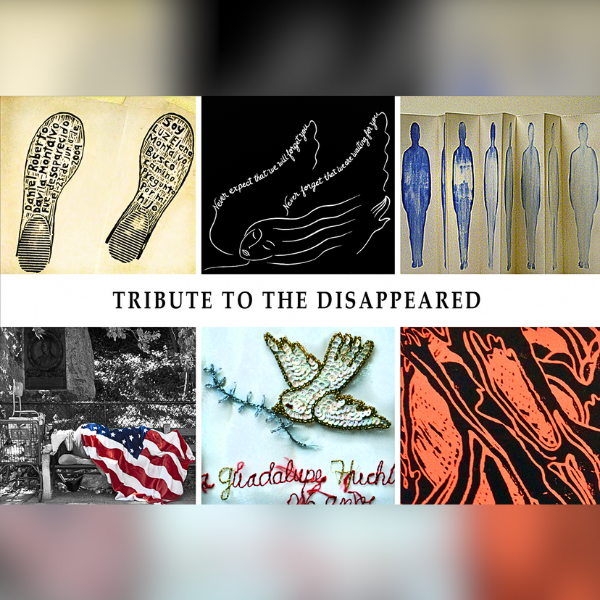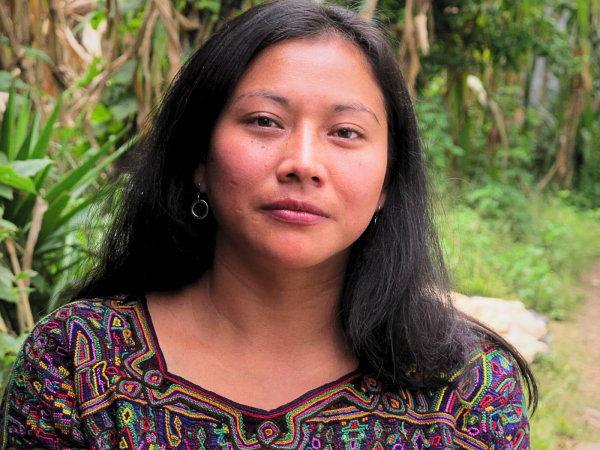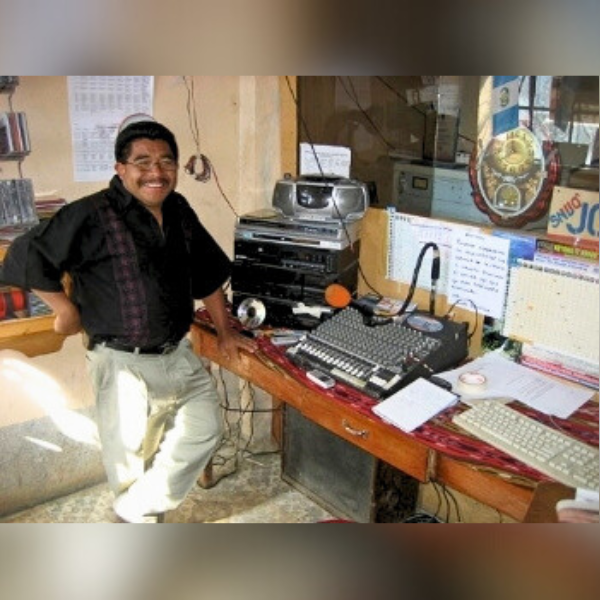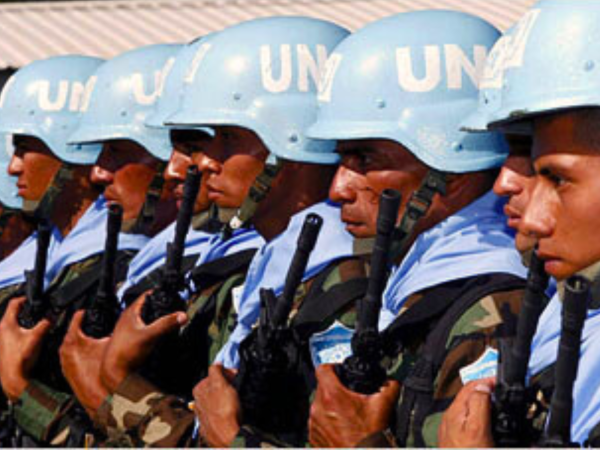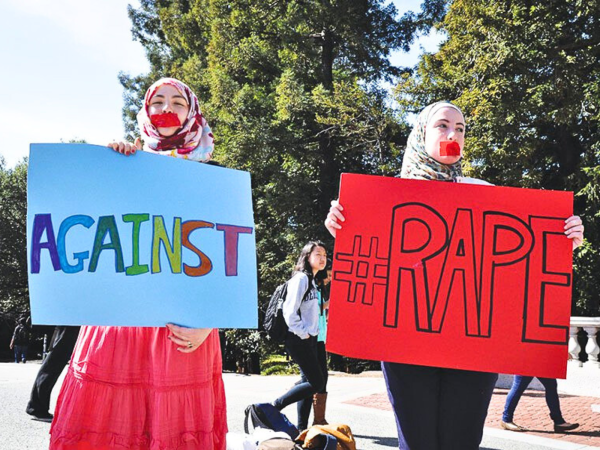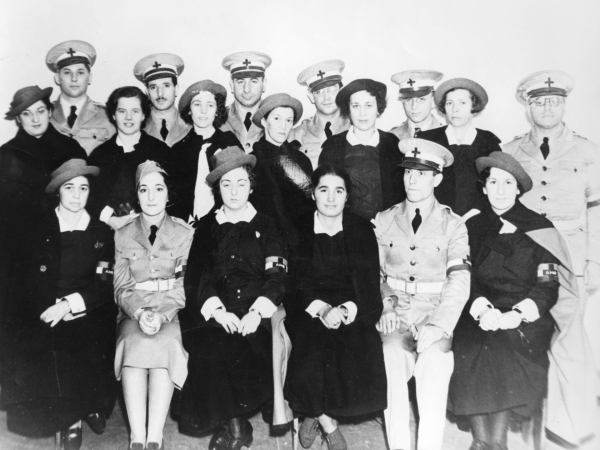Past Events
Please visit CCNY CWE's Upcoming Events page for all scheduled Frances S. Patai Program Lecture Series public events.
Impact of the "Revolution of Common Sense" on the European Right
Apr 07, 2025
Jarosław Szczepański – Ph.D. in law (2016), politics and administration (2019), habilitated doctor in politics and administration (2021), research and teaching associate at the Faculty of Political Science and International Studies of the University of Warsaw. Grant holder of Fulbright – Fulbright Slavic Award 2020. In 2016-2017, deputy dean for scientific affairs at the Department of National Security Department of the Academy of War Arts, from 2017 president of the board of the Institute for Political Science.
Transatlantic Civil Rights Activism: Linking the Civil Rights Movements in Northern Ireland and the United States in the 1960s
Feb 24, 2025
The civil rights movement in the United States was a vital source of inspiration for civil rights campaigners in Northern Ireland from the 1950s onwards. Irish activists deployed the innovative protest tactics pioneered in the US, adopted some of the American movement’s slogans and songs and drew parallels between the discrimination faced by African-Americans and the Catholic minority in Northern Ireland. When the civil rights campaign in Northern Ireland grew into a mass movement in the late 1960s key figures travelled to the US to seek support and build alliances. Direct links were established despite the hostility of many conservative Irish-Americans to the civil rights movement in the US.
Ghost Mountain Film Screening with Director Q&A
Oct 07, 2024
Ghost Mountain chronicles the journey of Bunseng Taing, the director’s father, a Cambodian refugee who reached Connecticut in 1980 after surviving both the Killing Fields and a previously undocumented horror. Among the 45,000 refugees who sought safety in Thailand, he was forced back over the Cambodian border into an area heavily infested with landmines.
The Third Critical Perspectives on Human Rights Conference
April 17-19, 2023
In April, we held the Third International Conference on Human Rights, which was an extremely successful event with over 100 participants from 25 countries. Please visit the conference page for details about the program, participants, art exhibition, and media galleries.
Paghilom Children
by Filipino freelance photographer Raffy Lerma
Forced Migrations from Venezuela: Challenges of Departure and Asylum Seeking
October 16, 2023 | 6 pm
Online Event | Registration Closed
A conversation with the founders of Venezuelans and Immigrants Aid (VIA).
Moderated by Dr. Susanna Rosenbaum, associate Professor of Anthropology at CCNY CWE.
The Second CCNY’s Critical Perspectives on Human Rights CONFERENCE
April 20-22nd, 2022
How do human rights work in a world that is both territorialized in sovereign states and deterritorialized through global capitalism? CCNY’s Second Critical Perspectives on Human Rights Conference (CPHRC) seeks to interrogate the complex relationships that exist between political and economic power, on the one hand, and rights claims, on the other. In what ways are rights, as codified in international law, the product of postwar world order, and how are they challenged—or supported by—neoliberal economic norms, policies, and modes of governance? Do rights limit or undermine contemporary forms of domination, or do they perhaps legitimize them and even forestall alternative projects? In other words, can rights have a transformative impact in the age of neoliberalism? In what ways do rights discourse, law, and human rights practice reproduce or challenge social hierarchies of class, geography, and legal status, as well as ability, gender, race, and sexuality?
The Critical Perspectives on Human Rights Conference is part of a larger initiative at CUNY's The City College of New York shared between the President’s Office, the Division of Interdisciplinary Studies at the Center for Worker Education, the Colin Powell School for Civic and Global Leadership, the Division of Humanities and the Arts, and dedicated to human rights studies, public programming, and scholarship.
The Succeeders
December 2nd, 2021 | 6-7:30 pm
Online Event | Registration Closed
Immigrants, Education, and Belonging in the United States.
A Book Conversation with Dr. Andrea Flores.
Global Narratives of Crime, War, and Justice
May 3rd - 7th, 2021 | 12-2 pm
Online Event | Applications Closed | Download Program (PDF)
"How can we use social media, film, and TikTok to mobilize against injustice? How can we generate collective action to end impunity and transform legal frameworks that enable it?"
- Luis Moreno Ocampo, Founder Chief Prosecutor of the International Criminal Court
In the 21st century, film and social media can cultivate pressure for policy change and for human rights violators to be brought to justice. Global Narratives invites students to explore how legal architectures and popular narratives shape justice demands and can enable or impede collective action that seeks to generate political and social transformation.
Hate in Homeland: The Rise of the Global Far Right
April 22nd, 2021 | 5 pm
Online Event | Registration Closed
A Book Talk with Dr. Cynthia Miller-Idriss.
Moderated by CCNY Prof. Rajan Menon.
Opening remarks by CCNY President Vincent Boudreau.
Fronteridades: Cultural Representations of Migrancy, Grievability, and Deportability in the North American Borderlands
March 24th, 2021 | 6:30-8 pm
Online Event | Registration Closed
Presentation by Professor Javier Duran, The University of Arizona.
Moderated by Professor Susana Rosenbuam, CCNY Downtown.
The Human Rights Impacts of COVID-19
October 15th, 2020 | 6:30-8:30 pm
Online Event | Registration Closed
A Conversation with Lou Charbonneau, Rajan Menon, and Linda Villarosa.
Louis Charbonneau is the United Nations director at Human Rights Watch. Prior to joining HRW in 2016, he was a journalist for more than two decades in the U.S., Europe and Asia. His last post was as UN bureau chief for Reuters. He won several awards for his reporting on the UN. He is also pursuing a PhD in political science at the City University of New York Graduate Center.
Rajan Menon holds the Anne and Bernard Spitzer Chair in International Relations at the Powell School, City College of New York/City University of New York, a Senior Research Scholar at the Saltzman Institute of War and Peace Studies, Columbia University, and a Non-Resident Fellow at the Quincy Institute for Responsible Statecraft. He has been a Fellow at the Carnegie Council on Ethics in International Affairs and the New America Foundation, Academic Fellow at the Carnegie Corporation, at Research Scholar the Kennan Institute, Woodrow Wilson International Center for Scholars (the Wilson Center), and Senior Fellow at the Council on Foreign Relations. His two most recent books are Conflict in Ukraine: The Unwinding of the Post-Cold War Order, coauthored with Eugene Rumer (MIT Press, 2015), and The Conceit of Humanitarian Intervention (Oxford University Press, 2016).
Linda Villarosa is a contributing writer to the New York Times Magazine, covering race and public health and a former executive editor at Essence Magazine. Her 2018 Times Magazine cover story on infant and maternal mortality in black mothers and babies was nominated for a National Magazine Award. Last year she contributed to the ground breaking 1619 Project. Her essay highlighted physiological myths, based on race, that have endured since slavery. Linda's April 29 cover story examined race, health disparities and covid-19 through the lens of the Zulu Social Aid and Pleasure Club of New Orleans, and her August 2 article, The Refinery Next Door, looked at environmental justice in Philadelphia. Linda teaches journalism and Black Studies at the City College of New York and is writing the book Under the Skin: Race, Inequality and the Health of a Nation, which will be published by Doubleday in 2021.
The Silence of Others
October 5th, 2020 | 6:30-8 pm
(Free access to the Film from 9/22 to 10/5)
Online Event | Registration Closed
Film Screening.
Commentary by Stephanie Golob & Fernando Trevesí.
#AllMustFall
April 21st, 2020 | 6:30 pm
CCNY Downtown Campus, 25 Broadway, 7th Floor
Lecture by Dean Lesley Lokko.
Moderated by Prof. Susanna Schaller.
In 2015 & 2016, South Africa was rocked by two widespread student protest movements, #RhodesMustFall and #FeesMustFall, which brought tertiary education across the country to its knees. One unintended consequence of the anger directed at universities for their failures to address issues of race, class and privilege in meaningful ways was the space that was opened up in many disciplines to question and interrogate the inherited Western canon and its relevance to a rapidly changing and changed world. In architecture, the introduction of a transformative pedagogy capable of taking on such issues has brought questions of inter-, cross- and multidisciplinary practice and thinking to the fore. Prof Lokko's 30-minute talk will combine video, documentary footage and student work from her tenure as the Director of the Graduate School of Architecture at the University of Johannesburg, drawing parallels between South Africa and the US in light of her ambitions for CCNY's Spitzer School of Architecture.
Lesley Lokko is an architect, academic and the author of eleven best-selling novels. She is currently the Dean at The Bernard and Anne Spitzer School of Architecture at The City College of New York. Before arriving at CCNY, she served as the Head of School at the Graduate School of Architecture, University of Johannesburg, South Africa. She is the editor of White Papers, Black Marks: Race, Culture, Architecture (University of Minnesota Press, 2000); editor-in-chief of FOLIO: Journal of Contemporary African Architecture and is on the editorial board of ARQ (Cambridge). In 2004, she made the successful transition from academic to novelist with the publication of her first novel, Sundowners (Orion 2004), a UK-Guardian top forty best-seller, and has since then followed with ten further best-sellers, which have been translated into fifteen languages.
Susanna Schaller is an Assistant Professor in Urban Studies and Planning in the Division of Interdisciplinary Studies at the Center for Worker Education. She earned her PhD in City and Regional Planning and is a certified urban planner. Her work focuses on urban governance, zoning, the politics of commercial district “revitalization” and small business development. She examines processes of urban restructuring and place making through public-private partnership regimes and explores the intersection of ethnicity, race and class in urban planning discourses and the construction of “ideologies place. ” Her book Business Improvement Districts and the Contradictions of Placemaking: BID Urbanism in Washington, D.C. was recently published by the University of Georgia Press.
Tehran Children: A Holocaust Refugee Odyssey
March 5th, 2020 | 6:30 pm
CCNY Downtown Campus, 25 Broadway, 7th Floor
A Book Talk with author Mikhal Dekel in conversation with Salar Abdoh.
Most Polish Jews who escaped Nazi extermination survived as refugees in Uzbekistan and Kazakhstan. Blending memoir, history and travelogue, Tehran Children follows their odyssey. Mikhal Dekel traverses the globe in these refugees footsteps, visits archives, locations and people in Uzbekistan, Poland, Russia, Israel and (through a proxy) Iran, meets with former refugees and current residents, and pieces together not only the story of her father and hundreds of thousands of survivors like him, but of the geopolitical shifts that their arrival had put in motion in the Soviet Union and the Middle East. Along the way she converses with Polish nationalists, Russian oligarchs and human rights activists, Iranians, Korean Uzbeks and Israelis, painting a story of interlinked and divergent histories, of death and survival, of hospitality and cruelty, and of the politics of twenty-first century memory and historical amnesia.
Mikhal Dekel teaches English at CCNY and directs the Rifkind Center for the Humanities and Arts. Her book Tehran Children: A Holocaust Refugee Odyssey was published by WW Norton in October 2019. She is also the author of The Universal Jew: Modernity, Masculinity and the Zionist Moment from 2011 and Oedipus in Kishinev from 2014. Since its publication, Tehran Children has been or is due to be featured in the New York Times, C-Span, Journal of Foreign Policy, the NY Daily News, The Guardian and the BBC, among other venues.
Salar Abdoh is an Iranian novelist and essayist who has authored The Poet Game and Opium. He has also edited and translated the anthology Tehran Noir, and his last book was Tehran At Twilight. He was a writer for the theater troupe Dar a Luz and correspondent for the National Geographic documentary, Hell on Earth: The Fall of Syria and the Rise of ISIS. He lives in Tehran and New York City where he teaches Creative Writing in the MFA program at the City College of New York. His forthcoming book is Out of Mesopotamia.
A World Divided: The Global Struggle for Human Rights in the Age of Nation-States
March 3rd, 2020 | 6:30 pm
CCNY Downtown Campus, 25 Broadway, 7th Floor
A Book Talk with Eric Weitz in conversation with Rajan Menon.
In our world of 193 nation-states, who actually has the "right to have rights"? What do we mean by human rights? And how do we obtain rights? None of these questions has an easy answer; they are the questions that animate Eric Weitz's new book, A World Divided. He addresses them in a book that spans 250 years and virtually every continent on the globe. He discusses his new book with Rajan Menon.
Eric D. Weitz is Distinguished Professor of History at City College and the Graduate Center, City University of New York. He is also the former Dean of Humanities and Arts at City College. Trained in modern German and European history, Weitz also works in international and global history. His most recent book, A World Divided: The Global Struggle for Human Rights in the Age of Nation-States, was published by Princeton in September 2019. Other major publications include Weimar Germany: Promise and Tragedy (2007; Weimar Centennial (third) edition 2018), and A Century of Genocide: Utopias of Race and Nation (2003; reprint with new foreword 2014). Weitz edits a book series for Princeton, Human Rights and Crimes against Humanity. He lectures widely in public and academic settings on the history of human rights and genocides and on Weimar Germany.
Rajan Menon, the Anne and Bernard Spitzer Chair in International at the City College of New York was previously the Monroe J. Rathbone Distinguished Professor and Chairman in the Department of International Relations at Lehigh University. He has been a Fellow at the Council on Foreign Relations, the New America and an Academic Fellow and Senior Adviser at the Carnegie Corporation of New York. He has taught at Columbia University and Vanderbilt University and served as Special Assistant for Arms Control and National Security to Congressman Stephen J. Solarz (D-NY). A 2002-03 Carnegie Scholar, he has also received fellowships and grants from the Woodrow Wilson Center, the Council on Foreign Relations, the Rockefeller Foundation, the John D and Catherine T. MacArthur Foundation, and the US Institute of Peace. The most recent of his several books are Conflict in Ukraine: The Unwinding of the Post-Cold War Order (MIT Press, 2015), co-authored with Eugene B. Rumer, and The Conceit of Humanitarian Intervention (Oxford University Press, 2016).
Critical Refugee Studies: Rethinking Conventions, Securitization, Resistance
November 18th, 2019 | 6:30-8 pm
Online Event | Registration Closed
The number of refugees has reached a record-level high, with the United Nations High Commissioner for Refugees (UNHCR) estimating the size of this population at 30 million. Distinguished Professor Domna Stanton will join us to discuss what it means to examine forcible displacement through a critical lens, as well as the current humanitarian challenges faced by refugees fleeing to European Union (EU) countries, the EU’s responsibilities according to international law, and how its members have responded to the need for protection. Susana Rosenbaum, Associate Professor of Anthropology, will moderate the discussion and draw comparisons with the humanitarian tragedy currently unfolding at the US border.
Domna Stanton, Distinguished Professor of French at the Graduate Center, CUNY, is the author, most recently, of The Dynamics of Gender in Early-Modern France (2014). In addition to her book, The Aristocrat as Art, Stanton is the editor of The Female Autograph; The Defiant Muse; and Histories of Sexuality: From Aristotle to AIDS. She coedited “A Woman who Defends all the Person of her Sex”: Selected Philosophical and Moral Writings of Gabrielle Suchon (2010), and Enchanted Eloquence: Fairy Tales by 17th-century Women Writers (2011). Stanton was president of the Modern Language Association in 2005 and editor of PMLA from 1992 to 1997; she co-edited with Judith Butler a special issue of PMLA (Fall, 2006) on the humanities and human rights, a field that has engaged her graduate teaching and writing over the past decade. Stanton sits on several non-profit boards and committees, including the Modern Language Association, Human Rights Watch, and Columbia University's Maison Francaise. Stanton's next book is The Monarchy, the Nation and its Others: France in the Age of Louis XIV.
Susanna Rosenbaum is Associate Professor of Anthropology in the Department of Interdisciplinary Arts and Sciences and Director of the MA in the Study of the Americas. Her research and teaching center immigration, race, and citizenship; gendered labor and neoliberalism; kinship and reproduction; and the Americas. Her book Domestic Economies: Women, Work, and the American Dream in Los Angeles (2017) examines how Mexican and Central American domestic workers and their primarily white employers seek to achieve the American Dream.
Planetary Impacts of Environmental Change: From Global to Local
October 30th, 2019 | 7 pm
Online Event | Registration Closed
Karin Block is an Associate Professor of Earth and Atmospheric Sciences at City College of New York. Born and raised in San Juan, Puerto Rico, she earned an A.B. in Literature, Science and Arts from the University of Michigan in Ann Arbor and a Ph.D. in Earth and Environmental Sciences from the CUNY Graduate Center. She is affiliated with the Lamont-Doherty Earth Observatory of Columbia University (LDEO) as an Adjunct Associate Research Scientist. She is a geochemist and petrologist who investigates the role and evolution of minerals in high and low temperature earth systems. Her current research focuses on how feedbacks between clay minerals and microbes affect carbon cycle dynamics in soils. She has trained students in a wide array of research topics ranging from virus-mineral interactions to mining biotechnology to pollution monitoring in estuarine environments.
Ana Carnaval is an Associate Professor of Biology at City College of New York. She earned her MSc. in Zoology from Museu Nacional do Rio de Janeiro, in her home country, Brazil, and moved to the U.S. to pursue a doctoral degree in Evolutionary Biology from the University of Chicago. Her research group studies global patterns of biodiversity and their underlying evolutionary and ecological processes, with a special focus on the American tropics. She is particularly interested in integrating data and tools from the fields of genetics and genomics, earth and atmospheric sciences, and physiology, to understand 1) how species responded to climate change in the past, and 2) how they may respond in the future.
Susanna Schaller is an Assistant Professor in Urban Studies and Planning in the Division of Interdisciplinary Studies at the Center for Worker Education. She earned her PhD in City and Regional Planning and is a certified urban planner.Her work focuses on urban governance, zoning, the politics of commercial district “revitalization” and small business development. She examines processes of urban restructuring and place making through public-private partnership regimes and explores the intersection of ethnicity, race and class in urban planning discourses and the construction of “ideologies place.” Her book Business Improvement Districts and the Contradictions of Placemaking: BID Urbanism in Washington, D.C. was recently published by the University of Georgia Press.
The First CCNY’s Critical Perspectives on Human Rights CONFERENCE
March 13-15th, 2019
About the Conference
The UN Universal Declaration of Human Rights celebrated its 70th birthday on December 10, 2018. Since that statement of principles following the mass atrocities of WWII, the world has witnessed the spread of human rights discourse, norms, law, and institutions at both the domestic and international levels. Eleanor Roosevelt’s prediction that “a curious grapevine” would spread the ideas articulated in that 1948 General Assembly document seems to have come to fruition. Nevertheless, the aspirations of the Declaration remain far from fulfilled, as grave violations of rights continue to be perpetrated around the globe, often with impunity. Economic inequality, racism, sexism, and multiple refugee crises have engendered and exacerbated the rise of political extremism. Addressing such issues, as well as many others, the Critical Perspectives on Human Rights Conference aims to explore the contested legacy of human rights in increasingly uncertain times. It seeks to foster dialogue and scholarship from a wide range of perspectives. Some conference presenters are scholars and activists who continue to view the human rights project as a moral and ethical challenge to power; others see it as an enabler of political and economic domination. The Critical Perspectives on Human Rights Conference participants seek to reassess the origins, foundations, and contemporary forms of human rights discourse, ideas, and practice today, seventy years on. Conference presenters have institutional affiliations that span nearly twenty countries: Argentina, Austria, Belgium, Canada, China, Estonia, Germany, Hungary, India, Italy, Nigeria, the Philippines, Portugal, Republic of Korea, Spain, South Africa, the United Kingdom, and the United States.
Conference presenters have institutional affiliations that span nearly twenty countries: Argentina, Austria, Belgium, Canada, China, Estonia, Germany, Hungary, India, Italy, Nigeria, the Philippines, Portugal, Republic of Korea, Spain, South Africa, the United Kingdom, and the United States.
The Critical Perspectives on Human Rights Conference is part of a larger initiative at CUNY's The City College of New York shared between the President’s Office, the Division of Interdisciplinary Studies at the Center for Worker Education, the Colin Powell School for Civic and Global Leadership, the Division of Humanities and the Arts, and dedicated to human rights studies, public programming, and scholarship.
The Fate of Liberalism in the Rising Tide of Authoritarianism
April 23rd, 2018 | 6:30-8 pm
CCNY Downtown Campus, 25 Broadway, 7th Floor
A Conversation with Rajan Menon and Eric Weitz.
Moderated by Kathy McDonald.
The world is witnessing a global slide backward on human rights. Freedom House has even proclaimed that 2017 marked the twelfth year of a continuous decline in freedom worldwide and the most serious crisis for democracy in decades. With the United States retreating from its commitment to a liberal order, the rise of far-right parties in Europe and elsewhere, and the increasing influence of authoritarian Russia and China on the world stage, the fate of human rights norms hangs in the balance. Prestigious CCNY faculty members Rajan Menon and Eric Weitz engage in open conversation, with CWE Chair Kathy McDonald moderating, on the fate of the postwar liberal order in the face of such trends.
Mojados - Portraits of Immigrants
October 4th - December 20th, 2017
MON-FRI - 10 am to 8 pm | SAT - 10 am to 4 pm
CCNY Downtown Campus, 25 Broadway, 7th Floor
Photographs by Francisco Uceda.
A conversation on Human Rights: Making Historical Memory Into Present Action
February 9th, 2017 | 7-9 pm
CCNY Downtown Campus, 25 Broadway, 7th Floor
Featuring scenes from the play Villa by Guillermo Calderón.
Tribute to the Disappeared
September 26th, 2016 | 6-8 pm
CCNY Downtown Campus, 25 Broadway, 7th Floor
Art Exhibition.
Curated by Andrea Arroyo
An ongoing art project in honor of the disappeared in Mexico and other victims of injustice around the world, with over 300 international artists participating.
500 Years
September 14th, 2016 | 6-8:30 pm
CCNY Downtown Campus, 25 Broadway, 7th Floor
500 Years tells the story through Mayan eyes of a moment that may change Guatemala forever. For centuries a tiny white elite has ruled over the majority indigenous Mayan population, maintaining their power through racism and violence. When this elite was threatened by democracy in 1954, the CIA staged a coup, setting in motion decades of repression, impunity, and genocide. But the Mayan people have preserved their culture in the cauldron of resistance. In 2012 indigenous survivors forced a national trial for genocide, won a historic victory, and then forged an unprecedented alliance with non-indigenous Guatemalans to overthrow a corrupt President. Following the film, there will be a discussion with the filmmakers, and the audience will be asked to fill out a questionnaire to provide feedback in the editorial process.
Human Rights Activism in Guatemala
November 5th, 2015 | 6:30-8 pm
CCNY Downtown Campus, 25 Broadway, 7th Floor
A Conversation with Lorenzo Mateo.
“Never Again”: Mass Atrocity Prevention in the Twenty-first Century and the Responsibility to Protect
May 4th, 2015 | 6:30-8:30 pm
CCNY Downtown Campus, 25 Broadway, 7th Floor
Frances S. Patai Lecture Series
Guest speaker: Dr. Simon Adams, Executive Director of the Global Center for the Responsibility to Protect (GCR2P)
Moderator: Professor Rajan Menon, CCNY Political Science Department
This year marks the one-hundredth anniversary of the Armenian genocide and the twentieth anniversary of the Srebrenica massacre. It is thus a critical time for the human rights community to assess progress on the development of international norms, law, and efforts to prevent and halt genocide and other mass atrocities. At the heart of contemporary debates is the Responsibility to Protect (R2P) doctrine. While R2P has been considered an “emerging norm,” the application of R2P remains contested in international peace and security circles. Dr. Adams will discuss the R2P doctrine, its evolution over the past decade and a half, and challenges that impede consensus on when the international community of states should invoke R2P to protect civilians from mass atrocity crimes.
Sexual Violence in Armed Conflict
March 30th, 2015 | 6:30-8:30 pm
CCNY Downtown Campus, 25 Broadway, 7th Floor
Frances S. Patai Lecture Series
Guest Speaker: Rana Jaleel, Postdoctoral Fellow, Columbia Law School
This event focuses sexual violence in armed conflict, particularly mass rape as a weapon of war. The event will begin with a screening of the PBS film I Came to Testify, which concerns the Bosnian rape camps, women’s testimony before the International Criminal Tribunal for the Former Yugoslavia (ICTY), and developments in international law to prosecute perpetrators. Dr. Jaleel will present her research on sexual violence in armed conflict. In addition to the Bosnian case, she will also discuss Rwanda and the Democratic Republic of the Congo, as well as present-day Syria.
Transnational High-Risk Activism and the Work of Frances S. Patai on the Spanish Civil War
March 19th, 2015 | 6:30-7:30 pm
CCNY Downtown Campus, 25 Broadway, 7th Floor
Frances S. Patai Lecture Series
Speaker: Danielle A. Zach, Frances S. Patai Postdoctoral Fellow in Holocaust, Genocide, and Human Rights Studies, CCNY CWE
Over the past few months, major US and other Western newspapers have drawn attention to the “unprecedented scale” of participation of foreign fighters in the bloody turmoil unfolding in Iraq and Syria, and more specifically to the success of the Islamic State of Iraq and Syria (ISIS) in recruiting American and European men and women to join its ranks. The US government estimates the total foreign presence at 20,000 from 90 or so countries. Since 9/11, the transnational connections of armed actors—particularly with diaspora communities in Western countries—have also received significant attention from academics and policy analysts, with many pointing to processes associated with globalization as facilitating factors. Using the Spanish Civil War as a case study, the lecture presents the work of Frances S. Patai on female volunteers of the American Medical Bureau and North American Committee to Aid Spanish Democracy to show how high-risk transnational activism of this kind is neither a new development arising from contemporary globalization nor “unprecedented” in magnitude. Indeed the Second Spanish Republic’s ability to draw estimated 40,000 volunteers as combatants into the ranks of its International Brigades along with another 10,000 in support roles to defend it against Nationalist forces far surpasses what we are witnessing in the Middle East (or any other conflict zone) today.
Last Updated: 05/06/2025 17:21
